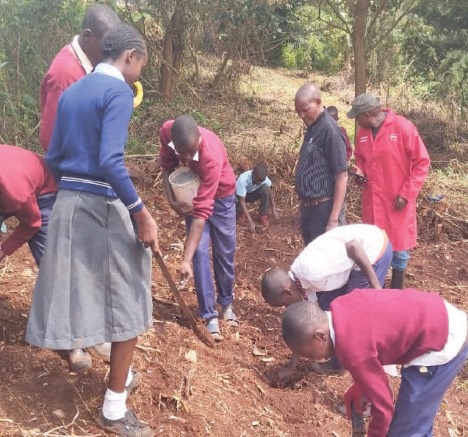“Elgon Kenya, Ministry of Agriculture and SMACHS Foundation supporting Nyanjega Primary School with establishment of a school farm.”
Limuru, renowned for its lush greenery and sprawling tea fields, offers breathtaking scenery that attracts investors seeking seclusion and privacy. Yet, hidden within this picturesque setting is Nyanjega Primary School, a modest institution in Tigoni’s Redhill region, struggling with inadequate necessities and amenities.
Established in the 1980s by Nanalal ‘Nanu’ Kantaria, one of the four sons of the late Dharamshi Kala Kantaria, a Gujarati trader who settled in Limuru in 1897, Nyanjega Primary School was created to educate children of underprivileged parents working in nearby tea plantations. His successful negotiation with the government for a 15-acre piece of land
where the school now stands is a testament to his commitment. He was the school’s patron and treasurer, his legacy continues to inspire ongoing efforts to uplift the institution. Despite its noble beginnings, the school has long faced
deprivation, impacting its performance in key examinations.
Charles Chogi, the school’s vice-chair, highlights how these challenges have historically hindered the school’s success.
However, the Ministry of Agriculture and Livestock Development , Elgon Kenya Ltd, a regional supplier of agricultural inputs and solutions, and SMACHS Foundation have stepped in to revive the school’s fortunes. They have supported the school to set up a 4K-club on two acres of its land and an additional four acres is ongoing. The farm, once fully operational will serve as a learning centre within the government efforts to revive and revamp 4K-clubs in the country through a joint programme led by the ministries of education and agriculture in partnership with private sector and development partners. Elgon Kenya is playing a leading role in this endevour. The special support for Nyanjega stems from Elgon Kenya history with this school and the Redhill region where it traces its origins.
One of the longest running programs by Elgon Kenya is the school feeding program, ensuring that children receive nutritious meals, essential for maintaining focus and engagement in their studies. This program addresses a critical need, as many students come from disadvantaged backgrounds and lack basic necessities. Sometimes, this is the only meal these children have for a day, with a number coming to school without taking breakfast at home. The cup of uji they get here makes all the difference. The food attracts some pupils to school, since they know they will not stay hungry, said Mr Choge. On 10th March, Elgon Kenya’s Director Lina Kantaria organized a medical health check for the school where the children were dewormed and guardians benefited from eye-check up with Optica and a food-hamper, she also donated books for the school library. She promised to assist in the setting up the computer lab.
The 4K-Club farm is expected to augment the food in a big way through production of fruits, vegetables, cereals and possibly dairy cows. It could also generate income for the school that is struggling financially.
Elgon Kenya’s involvement aligns with its commitment to promoting agriculture in schools through the revived 4K Club programs, an initiative to create awareness and inculcate a positive mindset towards agriculture among school going children, encouraging them to see the immense benefits of this sector to the country’s economy and food security . With 228 primary students and several in secondary education, these initiatives have significantly boosted the school’s growth and potential.
During the launch of the 4K Club Presidential Awards Scheme last year, Dr Kantaria highlighted the key role that young people would potentially play in creating a farming revolution in Kenya, which informed his company’s resolve to support the 4K Club programme. “A key message that we would like to pass to the youths in the 4K Club programme is that agriculture is not just about tilling land and crop cultivation. It is all about the entire value chain. And an immense world of opportunities exists within this value chain,” he said. “We therefore need more young people to get into agriculture and fully engage in it.”
Despite these advancements, Nyanjenga Primary School still faces challenges such as poor infrastructure, inconsistent food supplies, and a lack of essentials like uniforms, learning materials, and sanitary towels. Vice-chair Chogi appeals for additional support from donors to further enhance the school’s development and address the ongoing needs of the students and their families.

